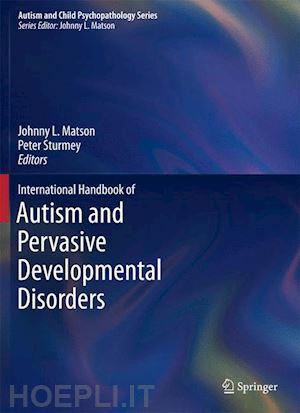
Questo prodotto usufruisce delle SPEDIZIONI GRATIS
selezionando l'opzione Corriere Veloce in fase di ordine.
Pagabile anche con Carta della cultura giovani e del merito, 18App Bonus Cultura e Carta del Docente
Since the early 1940s, when first identified as childhood psychosis and autistic psychopathy, autism spectrum disorder (ASD) has continued to burgeon into a major focus of inquiry and interest among researchers, practitioners, and the public alike. With each passing decade, the number of scholarly articles addressing ASD and related disabilities continues to soar. Today, thousands of papers on autism are published annually across various disciplines and journals, making it challenging – if not impossible – to keep pace with, let alone synthesize, all the latest developments.
Based on a solid historical foundation of autism theory and research, the International Handbook of Autism and Pervasive Developmental Disorders integrates the broad scholarly base of literature with a trenchant analysis of the state of the field in nosology, etiology, assessment, and treatment. Its expert contributors examine recent findings and controversies (e.g., how prevalent autism actually is), along with longstanding topics of interest as well as emerging issues.
Coverage includes:
The International Handbook of Autism and Pervasive Developmental Disorders is an indispensable resource for researchers, professors, graduate students, and allied practitioners in clinical child and school psychology, child and adolescent psychiatry, education, social work, rehabilitation, pediatric medicine, and developmental psychology.
Section 1: Overview.- History and Evolution of the Autism Spectrum Disorders; J.K. Irwin, J. MacSween, K.A. Kerns.- Diagnostic Systems; C.L. Gillberg.- Prevalence and the Controversy; C.A. Campbell, S. Davarya, M. Elsabbagh, L. Madden, E. Fombonne.- Autism Spectrum Disorders and Intellectual Disability; L. Lecavalier, A.V. Snow, M. Norris.- Psychiatric Disorders in People with Autism Spectrum Disorders: Phenomenology and Recognition; S.B. Helverschou, T.L. Bakken, H. Martinsen.- Section 2: Nosology and Etiology.- The Genetics of Autism; D.K. Sokol, D.K. Lahiri.- Behavioral, Biopsychosocial, and Cognitive Models of Autism Spectrum Disorders; S.E. Lind and D.M. Williams.- Nosology and Theories of Repetitive and Restricted Behaviors and Interests; E. Gal.- Emotional Cognition: Theory of Mind and Face Recognition; N. Nader-Grosbois, J.M. Day.- Developmental Issues and Milestones; A. Thurm, S. Bishop, S. Shumway.- Sensory Processing and Motor Issues in Autism Spectrum Disorders; C.L. Hilton.- Section 3: Assessment.- Early Detection of Autism Spectrum Disorders; D.R. Dixon, D. Granpeesheh, J. Tarbox, M.N. Smith.- Diagnostic Instruments for the Core Features of ASD; J.A. Worley, J.L. Matson.- Assessment of Rituals and Stereotypy; O. Healy, G. Leader.- Assessing Challenging Behaviors in Autism Spectrum Disorders: Prevalence, Rating Scales and Autonomic Indicators; I.L. Cohen, J.H. Yoo, M.S. Goodwin, L. Moskowitz.- Functional Behavioral Assessment and Analysis; J. Ward-Horner, L.J. Seiverling, P. Sturmey.- Assessment of Co-morbid Psychopathology; L. Underwood, J. McCarthy, E. Tsakanikos.- Identifying Moderators of Treatment Outcome for Children with Autism; L. Schreibman, S. Dufek, A.B. Cunnigham.- Identifying Fad Therapies for Autism Spectrum Disorders and Promoting Effective Treatment; J.E. Tuzikow, S. Holburn.- Intensive Early Intervention; S. Eikeseth.- Teaching Adaptive and Social Skills to Individuals with Autism Spectrum Disorders; K. Thomson, K. Walters,G.L. Martin, C. T. Yu.- Functional Skill Replacement Training; N. Naoi.- Verbal Behavior and Communication Training; T.S. Higbee, T.P. Sellers.- Training Children with Autism and Pervasive Developmental Disorder to Comply with Health Care Procedures: Theory and Research; A.J. Cuvo.- Physically Active Living for Individuals with ASD: Intervention Strategies to Promote the Acquisition of Movement Skills; K.L. Staples, G. Reid, K. Pushkarenko, S. Crawford.- Aggression, Tantrums, and Other Externally Driven Challenging Behaviors; N.N. Singh, G.E. Lancioni, A. S.W. Winton, J. Singh.- Self-Injurious Behavior: I. Overview and Behavioral Interventions; F. Furniss, A.B. Biswas, B. Bezilla, A. Jones.- Self-Injurious Behavior: II. Pharmacological and Integrated Treatments; F. Furniss, A.B. Biswas, B. Bezilla, A. Jones.- Autism Spectrum Disorders: Comorbid Psychopathology and Treatment; S. Mohiuddin, S. Bobak, D. Gih, M. Ghaziuddin.- Rituals, Stereotypies, and Obsessive-Compulsive Behavior; J.E. Ringdahl.- Interventions to Treat Feeding Problems in Children with Autism Spectrum Disorders: A Comprehensive Review; L. Seiverling, K. Williams, J. Ward-Horner, P. Sturmey.- Training Staff and Parents: Evidence-Based Approaches; D.H. Reid, W.H. Fitch.- Adults with Autism Spectrum Disorders; S. Mahan, A.M. Kozlowski.
Johnny L. Matson has spent his career as a researcher and academically involved in the training of doctoral level clinical psychologists specializing in developmental disabilities. He is the major professor of 48 Ph.D.s, many of whom have served as professors in major universities. He is founding editor and editor-in-chief of Research in Autism Spectrum Disorders and Research in Developmental Disabilities. He has authored over 600 publications, including 34 books and 16 tests. He previously served on the psychology and psychiatric faculties at the University of Pittsburgh. For the last 23 years he has been a professor at Louisiana State University. He is currently a Professor and Distinguished Research Master, and Director of Clinical Training in the Department of Psychology at Louisiana State University.
Peter Sturmey is Professor of Psychology at Queens College and The Graduate Center, City University New York and a member of the Learning Processes and Behavior Analysis and Neuropsychology doctoral programs at City University of New York. He has published over 150 articles and 15 books on developmental disabilities. His current research focuses on applied behavior analysis and staff and parent training.











Il sito utilizza cookie ed altri strumenti di tracciamento che raccolgono informazioni dal dispositivo dell’utente. Oltre ai cookie tecnici ed analitici aggregati, strettamente necessari per il funzionamento di questo sito web, previo consenso dell’utente possono essere installati cookie di profilazione e marketing e cookie dei social media. Cliccando su “Accetto tutti i cookie” saranno attivate tutte le categorie di cookie. Per accettare solo deterninate categorie di cookie, cliccare invece su “Impostazioni cookie”. Chiudendo il banner o continuando a navigare saranno installati solo cookie tecnici. Per maggiori dettagli, consultare la Cookie Policy.